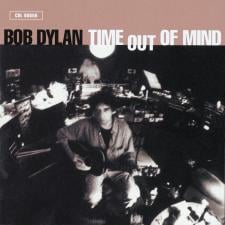Overview
Time Out of Mind, released in 1997, marked a significant comeback for Bob Dylan after a period of relative quiet and uneven critical reception in his career. The album is often considered one of the defining works of Dylan’s later period, rejuvenating his presence in the music world with its deeply introspective and somber tone. The production by Daniel Lanois, known for his atmospheric and textured style, added a haunting quality to the songs, which are characterized by themes of mortality, loss, and longing. This album stands out in Dylan’s catalog as a reflective and somber meditation on aging and the passage of time, resonating with the melancholy and introspective nature that Dylan embraced more fully in his later years.
The album includes standout tracks such as “Love Sick,” “Not Dark Yet,” “Standing in the Doorway,” and “Tryin’ to Get to Heaven.” These songs were praised for their lyrical depth and the emotional weight they carried. “Not Dark Yet,” in particular, was highlighted by critics for its poignant exploration of existential despair, with lines like “It’s not dark yet, but it’s getting there,” encapsulating the album’s overarching themes. Time Out of Mind received widespread critical acclaim, winning the Grammy Award for Album of the Year in 1998. The album’s somber mood and introspective lyrics struck a chord with both fans and critics, re-establishing Dylan as a vital and relevant voice in contemporary music.
The impact of Time Out of Mind on Dylan’s career was profound. It not only revitalized his commercial and critical standing but also set the tone for the next phase of his artistic journey. The success of the album paved the way for a series of strong releases in the 2000s, including “Love and Theft” and Modern Times, which continued to explore similar themes of time, memory, and mortality. The album is often seen as the beginning of a late-career renaissance for Dylan, demonstrating that he remained a powerful and relevant figure in music well into the later stages of his life.
Recording
The lead-up to Time Out of Mind involved a period of relative creative dormancy for Bob Dylan. After the release of Under the Red Sky in 1990, Dylan spent several years without producing new original material, focusing instead on albums of traditional folk and blues covers like Good as I Been to You (1992) and World Gone Wrong (1993). By the mid-1990s, Dylan was grappling with his place in the contemporary music scene, feeling somewhat disconnected from the recording process. The songs that would eventually make up Time Out of Mind were written during a lonely and snowy winter on his farm in Minnesota. Despite having these songs, Dylan initially hesitated to record them, uncertain if he wanted to invest the effort needed to bring them to life. It wasn’t until late 1996 that he decided to revisit the material, reaching out to producer Daniel Lanois, with whom he had previously collaborated on the critically acclaimed Oh Mercy in 1989.
The recording sessions for Time Out of Mind took place at Criteria Recording Studios in Miami, Florida, beginning in January 1997. The process was marked by a blend of spontaneity and meticulous craftsmanship, with Dylan and Lanois striving to create a sound that felt both contemporary and rooted in traditional blues. Lanois and Dylan used innovative techniques, such as building loops from old blues records and creating a haunting atmosphere that reflected the album’s themes of mortality and despair. The sessions were intense, with Dylan delivering powerful vocal performances that captured the raw emotion of the songs. Despite the challenging nature of the recording process, the result was an album that felt timeless, blending the old with the new in a way that resonated deeply with listeners. The production style, characterized by its “dirt-floor feeling” and loose, fraying edges, perfectly matched the introspective and often bleak content of the lyrics, helping to establish Time Out of Mind as one of Dylan’s most critically lauded works.
Critical Reception
Time Out of Mind was met with widespread critical acclaim and was hailed as a major comeback for Bob Dylan. Critics praised the album’s raw, introspective lyrics and its atmospheric production, which perfectly captured the themes of mortality, loss, and longing. The haunting and reflective tone of the album resonated deeply with both critics and fans, who saw it as a return to form for Dylan after years of uneven releases. The album won several prestigious awards, including the Grammy Award for Album of the Year in 1998, further solidifying its impact. Fans, particularly those who had followed Dylan’s career through its many phases, were struck by the album’s emotional depth and the way it seemed to echo the struggles and wisdom of an artist facing the twilight of his life. Time Out of Mind not only revitalized Dylan’s career but also cemented his status as a legendary figure who could still create relevant and powerful music late into his career.

DYLAN on THE ALBUM
- On the Nature of the Album: Dylan expressed, “Many of my records are more or less blueprints for the songs. This time, I didn’t want blueprints, I wanted the real thing. When the songs are done right they’re done right, and that’s it. They’re written in stone when they’re done right”.
- Recording Process: He elaborated on the recording process, saying, “We all know what the thing should sound like. We’re just getting further and further away from it. I wanted something that goes through the technology and comes out the other end before the technology knows what it’s doing”.
- Musical Style: Dylan noted the unpolished nature of the music on the album: “The purposely unpolished music… has a haunted, precarious tone that connects it to the most harrowing depths of the blues”.
- Themes of the Album: Reflecting on the themes, he mentioned, “I can’t help those feelings. I’m not going to try to make a fake Pollyanna view. Why would I even want to?”.
- On Mortality: Dylan shared a poignant thought: “When you think that you’ve lost everything, you find out you can always lose a little more”.
- Influence of Environment: He explained how his environment influenced his writing: “A lot of the songs were written after the sun went down. And I like storms, I like to stay up during a storm”.
- Philosophical Reflection: Dylan mentioned a phrase that resonated with him: “Work while the day lasts, because the night of death cometh when no man can work” (Source: New York Times, September 27, 1997).
- On the Character of the Songs: He remarked on the emotional complexity of the album, saying, “That’s just the nature of my personality. I can be jubilant one moment and pensive the next” (Source: New York Times, September 27, 1997).
- On the Album’s Reception: Dylan expressed pride in the album, stating that it was “far and away his best sustained work since the mid-1970s” (Source: New York Times, September 27, 1997).
- On the Overall Experience: He concluded with a reflection on his artistic journey: “Time Out of Mind is a typical Dylan album only because it eludes expectations” (Source: New York Times, September 27, 1997).
